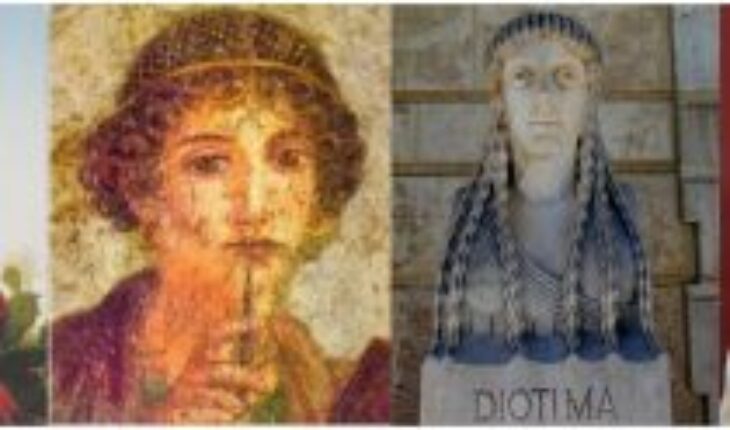The Muse of the Desert is a voracious reader, music lover and cultured. Also very innovative to create solidarity and culture. Write columns without fatigue. Therefore, he inspires by what he is, what he does and what he writes. He protested that I wrote about Love without referring to the opinion of women. Right, you’re right! I said. But in ancient times it is not so easy to find women’s writings about love. They were barely allowed to take care of the house, the offspring and the cattle. Their husbands auctioned them off to the highest bidder and exchanged them for items. In some Greek and Roman peoples they could not sit at table or speak without the permission of the lord. Their husbands had the right to repudiate them and throw them out on the street almost without invoking motive. Already at the height of the hills, in Celtic and Gallic peoples they were considered beasts of burden. It is unpleasant and painful to remember, but it is history.
As humanity we have lost much dignity and feminine talent for centuries and centuries. But to paraphrase Don Quixote, if some dogs bark, it is that women advance or ride. However, the important thing is not only to move forward but to do it in the right direction and in the right way, otherwise, you can walk in vain or to the precipice.
But let’s go back to Antiquity, when very few women for their enormous intelligence, character and cunning, or for exceptional environmental circumstances, managed to excel, they “rode the macho” and their wake reached today.
To excuse my omission claimed by the Muse of the Desert, I will invite to a banquet four extraordinary women of Antiquity who spoke of Love or lived it in a special way. I will call Enheduanna to come from Mesopotamia 4,300 years ago. She is a multifaceted woman, priestess of Love, first poet in history and astronomer. I will also invite Sappho, a poet of 2,600 years ago, cultured, powerful and devoted to Aphrodite. Sappho was bisexual and allegedly gave lesbian initiations to her female disciples at her school for women on Lesvos. I will ask for the great Diotima to come, because she was the priestess who taught Socrates about Love and spoke through the mouth of him in Plato’s Banquet, 2,400 years ago. And you can not miss Aspasia, outstanding woman of ancient Greece, lover and then wife of Pericles, teacher of philosophers and politicians in Athens, exempt speaker. The bad tongues said that Aspasia had a school for hetairas, the finest ladies-in-waiting in ancient Greece, cultured, intelligent, refined. Similar to what was a Geisha in Japan. That in turn allowed them a lot of freedom and access to power that married women did not have. But some say that Aspasia as Hetaria o regenta was a gossip of the comedians, historians and biographers of those times, to the detriment of Pericles, who married this foreigner contrary to a law that he himself dictated. Also because every woman and man who excels or who walks outside the established cultural rules or customs is subject to cursing. It is likely that they wanted to mistreat Aspasia’s reputation, being a very prominent woman in times of fierce patriarchy.
The guests arrived at the banquet wearing luxurious dresses of their time and strange hats. They walked along the cramped, damp, wooded path of my garden, brushing with their hands the huge ferns, buttocks and other plants that seemed exotic to them. Lavenders, jasmine and rosemary were responsible for perfuming us without fatigue. We had fresh wine with fruits and a touch of honey.
At the beginning of the banquet and being the oldest, Enheduanna stood up. She made songs and poems to Inanna, the Sumerian goddess of Love, war and fertility, called Ishtar in the Akkadian language. He recited to us a surprising poetry in the Sumerian language, which was translated by an expert on dead languages. They are fragments that we know until today.
“The women of the city no longer talk about love/ with their husbands./ At night they do not make love./ They are no longer naked before them,/ revealing intimate treasures.// Great daughter of Suen,/ impetuous wild cow, supreme lady commander of An,/ who dares not venerate you?”
But how! 4,300 years ago, was the absence of erotic desire, sensuality and sexual intimacy in older couples already a theme? Yes,” answered the high priestess of Love, lowering her head. I was very worried,” she added.
“And for four and a half millennia we have kept talking about the same thing! –trinket–. If this it would have been known before, Vanities, Vanity Fair and Cosmopolitan would have been left without a theme and bankrupt! Only Harry and Megan and the latest stretching novelties all over the body would have saved them.
Experts today blame a lack of sexual desire on stress, medications, overweight and depression. But do you think that in Mesopotamia 4,300 years ago all that existed? Of course not! There was also no TV, TV series, books, sleeping pills or football matches that plotted against eros. The symptom was the same as now, but the causes that experts point out today did not exist at that time. Strange! Will there be permanent, anthropological or biological causes? Perhaps it is something as natural as the hormones that influence libido and how they evolve during the life cycle of men and women of all times. It is a human and biological cause. And that must have made sense. Nor did they manufacture us to live as many years as now. I am inclined to think that biology and human nature tend to impose their law, more than other factors.
Maybe we can’t ask pears from the elm. Unless we hang pears from the elm. Is it not wiser to understand that the elm is also a grandiose tree, evergreen, which gives a magnificent shade, has a very firm root and is a pivot? In our south, its flower gives nectar to bees for the most exquisite honey, its wood is of a precious grain. That is, the elm gives as much or more Love than the pear, but in a different way. It procreates and becomes immortal as much as the pear tree. Now, a juicy pear for any marriage or older couple is always very good, it never hurts.
But Enheduanna didn’t just recite that to us. Also, despite the enormous power she had, she seems to have been a victim of sexual harassment 4,300 years ago, according to the interpretation given in an exhibition last year in New York. A degradation and suffering of women that continues to be repeated after four millennia. Enheduanna angrily claimed that a certain Lugalanne converted the temple “in a house of bad reputation, forcing its entry inside as if it were an equal”… “He has dared to approach me in his lust!”
In the next column I will continue to tell you what the great Sappho, Aspasia and Diotima told us at our banquet. As amazing as Enheduanna.
Follow us on
The content expressed in this opinion column is the sole responsibility of its author, and does not necessarily reflect the editorial line or position of El Mostrador.





